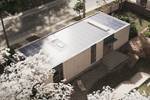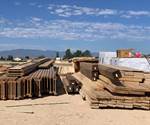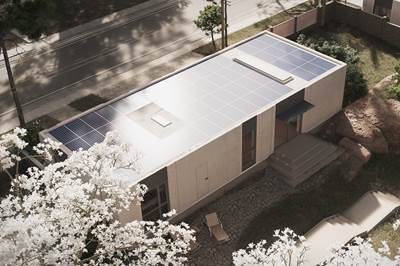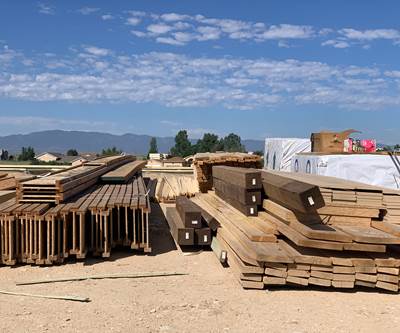
A prototype of Mighty Buildings’ two-bedroom, 864-square-foot modular home, built with continuous glass fiber-reinforced, 3D-printed panels. Construction for Mighty Trio homes, and other homes available as part of the Mighty Kit System, are expected to begin by the end of this year. Photo Credit, all images: Mighty Buildings
Last summer, (Oakland, Calif., U.S.) officially launched Mighty Mods, its 3D-printed, prefabricated modular accessory dwelling units (ADU), which are manufactured via a combination of additively manufactured thermoset resin panels and steel frames.
Now, in addition to selling and building Mighty Mods using the company’s extrusion- and UV-cure-based large-format additive manufacturing process, in 2021 the company is focusing on UL 3401 certification of a continuous glass fiber-reinforced version of its thermoset Light Stone Material (LSM). This will enable Mighty Buildings to begin building and selling its next product: the Mighty Kit System (MKS).
Mighty Mods are 350- to 700-square-foot, single-story structures that are printed and assembled at the company’s California facility and delivered ready-to-install via crane. According to Sam Ruben, chief sustainability officer (CSO) at Mighty Buildings, as the company looks to expand to customers outside of California and to building larger structures, there are inherent transportation limitations to shipping these ready-made structures. Therefore, the Mighty Kit System will include structural panels and other construction materials shipped for on-site assembly using basic construction equipment. The Mighty House product line is the first to use the Mighty Kit System and was developed in partnership with EYRC Architects and Buro Happold Engineering.

A rendering of a fully constructed Mighty Trio home.
The Mighty House line, all single-story, will range from 400-square-foot, one-bedroom ADUs up to 1,440-square-foot, three-bedroom, two-bath family homes. Ruben adds that contracts and orders have already begun coming in for these structures, and the company hopes to begin construction by the end of this year once all of the proper certifications are in place.
In addition, all Mighty Kits will use 3D-printed, fiber-reinforced thermoset composite structural panels. Ruben says that the fiber reinforcement enables parts made with the material to “have similar characteristics to reinforced concrete of the same size, with four times less weight and over four times better insulation.” The proprietary thermoset LSM has also been reformulated to be more sustainable, Ruben adds. This includes reducing the amount of binder, which he says allows them to reduce the total amount of polymer required to print the part, and the incorporation of recycled glass beads and other more sustainable fillers. “These allow us to deliver high performance in terms of structural quality and fire-performance while also maximizing material usage and meeting our sustainability goals,” he says.
Ultimately, Ruben says that the fiber-reinforced panels will enable the company to expand into multi-story single-family homes, multi-family townhouses, and three- to six-story low-rise apartment buildings. “We hope to start building demonstrator structures next year for these as well,” he says.
Next steps for the material include fire resistance, compression and tensile strength and temperature tests moving toward certification. Another 2021 goal for Mighty Buildings, Ruben says, is the identification of the company’s next manufacturing location — called a “Mighty Factory,” to enable the company to work more closely with builders outside of California and to manufacture components closer to high-demand areas.
Related Content
Natilus announces Horizon blended wing body CFRP aircraft for 200-passenger narrowbody market
Following its Kona cargo aircraft with 460 pre-orders, this larger all-CFRP model responds to airlines’ request to fill Boeing and Airbus gap with 25% less weight, 40% greater capacity and 50% less carbon emissions, to enter service by early 2030s.
Read MorePartners recycle A350 composite production waste into adjustable-length rods for MFFD
Herone, Spiral RTC, Teijin Carbon Europe and Collins Aerospace Almere recycle A350 thermoplastic composite clips/cleats waste into rods for the all-thermoplastic composite Multifunctional Fuselage Demonstrator’s crown.
Read MoreAl Seer Marine, Abu Dhabi Maritime unveil world’s largest 3D-printed boat
Holding the new Guinness World Record at 11.98 meters, the 3D-printed composite water taxi used a CEAD Flexbot to print two hulls in less than 12 days.
Read MoreECOHYDRO project to enable recyclable composites for hydrogen storage
With the involvement of two schools from the Institut Mines-Télécom, the 4-year project aims to improve the intrinsic properties of a composite material based on Elium via four concrete demonstrators.
Read MoreRead Next
3D-printed prefab homes aim to disrupt construction market
California startup Mighty Buildings’ award-winning prefabricated building production process relies on large-format 3D printing, UV-curable resins, digital design and automation.
Read MoreHome building with composites
There’s a house being built next door. It could be using more composites.
Read MoreCutting 100 pounds, certification time for the X-59 nose cone
Swift Engineering used HyperX software to remove 100 pounds from 38-foot graphite/epoxy cored nose cone for X-59 supersonic aircraft.
Read More
.jpg;width=70;height=70;mode=crop)












